The Hebrews in Egypt
Slave or Brother?
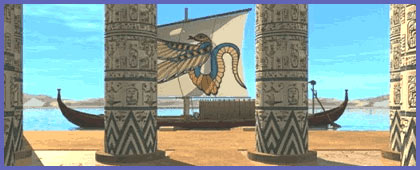
Much controversy has sprung up over the paternity of the original Israelites or Hebrews. I will not presume to have the answer, but in everything we need to look at the family history surrounding these people and the events that brought them into Egypt in the first place.

First, we need to define the term Hebrew.
From Greek Hebraios, from Aramaic Ibhraij someone from the other side of the river.
The other side of which River? Was it the Tigris and Euphrates or the Nile?
The Biblical account says the Hebrew eventually sprang from the loins of Shem [through Abraham] the brother of Cham and Japheth the sons of Noah. We are also are given the assumption that Noah had three sons who made up the Black, White and Asian 'races' of the world, but can this information be proven true outside of the Bible?
I asked the question what was the Hebrew language?
1. The ancient Semitic language of the Hebrews, revived and spoken in a modern form and as the formal language by Jews in Israel.
Why revive? What were they speaking before the revival?
What is a Jew or Hebrew?
2. A member of an ancient Semitic people, originally based in Palestine, and claiming descent from Abraham, an Israelite.
How could they be originally from Palestine when they when Abraham was from Ur of the Chaldees? And Abraham could not have been an Israelite since Israel was not yet born. Abraham was considered a gentile.
What is the difference between a Hebrew and a so-called Gentile?
A Hebrew [Hibaru] is one who adhere to the Law and one who was said to have crossed-over. Crossed over is another term for initiation, but initiation into what? And adhered to what Law? Did an initiation and Law exist in the land they multiplied and later was said to Exodus from?
Yes, it was the Initiation of the Hebrews through the so-called Mystery system and the Law of Maat.
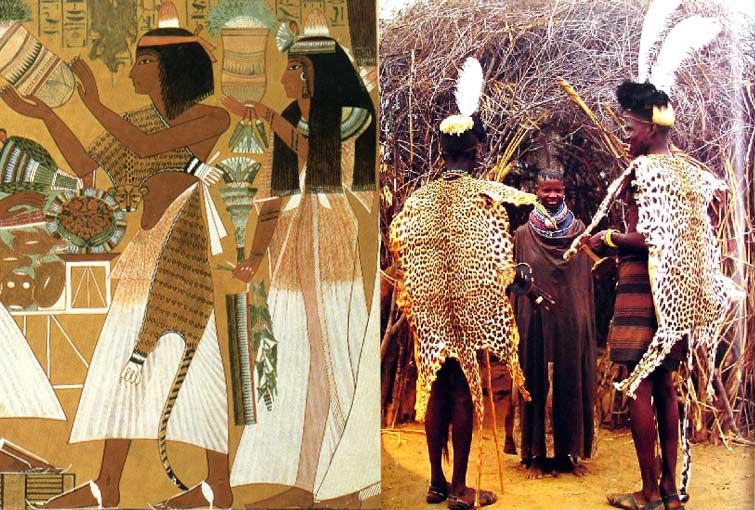
Leopard Skinned Priests in Egypt and Zulu's of Southern Africa
The Family of Abraham were Ethiopian and that term was a European used as the name for all Black Africans. [Read: What's in Name and the Name Game.]
Race Designation
Race classification and designation did not come into play until the advent of the so-called European. In his quest to separate the African family he used differences in facial features, hair texture and skin color to divide and conquer.
Later after intermarriage race became power, but Power and kingship was still derived from the African mother, until she was diluted and then factored out.
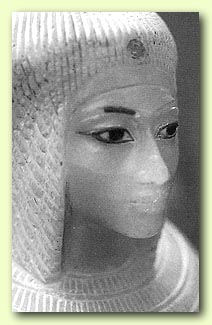
Kiya ?

Nefertiti Recreation
These two woman are said to be Hebrew or Israelites. I believe that term was a designation of family rituals and beliefs or even a specific priesthood or family line and not originally a different people or race.
The Family of Ankhenaten
According to the book Moses and Monotheism by Sigmund Freud, first published in 1939. In it, Freud argues that Moses was actually an Ancient Egyptian and in some way related to Ankhenaten, an ancient Egyptian monotheist.
So let us follow this theory to see if it can match up with the family history of Ankhenaten.
In the Islamic Koran the name of the family name of Ankhenaten Pharaoh or Amarna and his second wife Kiya is Imram, which was a derivation of the name of the biblical Moses' father Amram, and his mother Yocheved, whose name means glory of Yehovah 'the existing one'. Yocheved was Amram's father's sister [or uncle's wife] who he later married.
Amram's father was Kohath:
And the sons of Levi ; Gershon, Kohath, and Merari.
So that means Amram married his aunt through his father or one of his uncles wives.
Kiya was a lesser ranked wife of Akhenaton, often known as 'The Favorite' and also 'Greatly Beloved Wife' - there were many representations of her at Amarna, where she is thought to have held considerable power. She may be of the Eastern Ethiopian sect of today's Dravidians. Some scholars say Kia or Kiya was just another 'pet' name for Nefertiti.
Ahmed Osman the Egyptian born Arabic writer states that Yuya the vizier, was the biblical Joseph son of Jacob[ Israel] at the time before the biblical exodus was the father of Queen Tiye the mother of Akhenaton.
He also states that Sarah the wife of Moses was impregnated by the unnamed Pharaoh and Isaac was his son. The term Hibaru means: 'One who crosses over'. This crossing over is a term for the neophyte to be initiated into the Mystery [ university] religious system of Egypt.
![]()
So what do we have?
-
A fractured family?
-
A child born out of wedlock?
-
Strangers in Egypt?
-
White folks?
-
Invaders from the East?
I say no to the latter two! If the Biblical story can be verified the Hebrews were not slaves in Egypt as we understand slavery to be, because there was not slavery of the sort mentioned in Egypt at that or any other time. There is no word for slave in the hieroglyphic language of Egypt, and they did not build the Pyramids or any other monument.
The land of Goshen according to the Biblical account was:
'Region of Egypt which the Israelites inhabited during their sojourn in that country. It is described as situated on the eastern frontier of Lower Egypt (Gen. xlvi. 28, 29; Ex. xiii. 17; I Chron. vii. 21), forming an outpost of it (Gen. xlvi. 34); apparently not at all (or scantily) inhabited by Egyptians (ib.), but, in the estimation of shepherds, evidently "the best of the land", since Pharaoh's cattle grazed there .'
Why would slaves get the best of the land, even if they were cattlemen?
"According to verse 11 "the land of Ramses" is synonymous with "the land of Goshen." "Goshen" alone (without the addition "land of") is used only in xlvi. 28, 29. In these two verses it may designate a city, as the LXX [Septuagint - grk]. Understands it, which here renders "Goshen" by "Heroonpolis," adding in verse 28 to "unto Goshen" the words "into the land of Ramses"; in xlv. 10 the LXX. transliterates "Gesem of Arabia." The name "Goshen" (Egyptian, "Ksm," sometimes abbreviated into "Ks")"
It was reached only irregularly by the yearly inundation of the Nile, and therefore was less suited for agriculture. It is necessary only to assume that with the Semites or in popular Egyptian usage the name of "Kosem" (Goshen) was extended beyond the limits of the old country and its frontier fortifications.
It might also be assumed that the Israelites settled, in Joseph's time, in the old land of Goshen, and spread in the subsequent period over the newly colonized district; but this agrees less with the Biblical data.
No Egyptian etymology for the name "Goshen" (Kosem) has been found, which seems to be of Semitic origin; this would indicate Semitic settlers already c. 2000 or earlier. In Judith i. 9 ("the land of Gesem [R. V. "Goshen"] until thou comest above Tanis and Memphis") the name seems to be used without precise knowledge as to the location of the place.
Why would the best land be given to the family of Joseph? And why can't Goshen be found? Then after the Hebrews had become a threat, why was the land not taken from them? Why doesn't Egyptian history speak of Goshen? It speaks of everything else.
Joseph
Joseph was appointed to be regent or vizier[ which was the man who plotted the skies to find out when it was seedtime and harvest for the land] for Egypt and I believe it was based on familial ties. Those ties may have logically come from Sarah the woman who was married to the unnamed Pharaoh of Genesis and Abraham an d then later Abimelech. Sarah means princess, holy one and/or goddess.
Why was she called this? How did she receive this title-name? What was her real name?
Genesis 12:14-15--"When Abram came to Egypt, the Egyptians saw that she was a very beautiful woman. And when Pharaoh's officials saw her, they praised her to Pharaoh, and she was taken into his palace...He treated Abram well for her sake, and Abram acquired sheep and cattle, male and female donkeys, menservants and maidservants, and camels."
And Abraham was given a dowry for Sarah.
Genesis 20: 1-2--Now Abraham moved on from there into the region of the Negev and lived between Kadesh and Shur. For a while he stayed in Gerar, and there Abraham said of his wife Sarah, "She is my sister." Then Abimelech [my father the King] king of Gerar sent for Sarah and took her."
From the two scriptures Pharaoh took Sarah as his wife and Abimelech did also, but according to the Bible of the two Abimelech did not touch her.
Genesis 20:6-7 "Then God said to him in the dream, "Yes, I know you did this with a clear conscience, and so I have kept you from sinning against me. That is why I did not let you touch her. Now return the man's wife, for he is a prophet, and he will pray for you and you will live. But if you do not return her, you may be sure that you and all who belong to you will die."
But, Pharaoh touched her. Why would the Pharaoh sleep with a woman as old as Sarah is said to have been? During that time men and women only live to the age of 40 or more, although Abraham and Sarah are said to have lived to120 and99.
Here the Pharaoh is sad to have 'almost taken her to wife' does is mean he did not sleep with her?
12:13 Say,
I pray thee, thou [art] my sister: that it may be well with me for thy
sake; and my soul shall live because of thee.
12:14 And it came to pass, that, when Abram was come into Egypt, the
Egyptians beheld the woman that she [was] very fair.
12:15 The princes also of Pharaoh saw her, and commended her before
Pharaoh: and the woman was taken into Pharaoh's house.
12:16 And he entreated Abram well for her sake: and he had sheep, and
oxen, and he asses, and menservants, and maidservants, and she asses,
and camels.
12:17 And the LORD plagued Pharaoh and his house with great plagues
because of Sarai Abram's wife.
12:18 And Pharaoh called Abram, and said, What [is] this [that] thou
hast done unto me? why didst thou not tell me that she [was] thy wife?
12:19 Why saidst thou, She [is] my sister? so I might have taken her
to me to wife: now therefore behold thy wife, take [her], and go thy
way.
12:20 And Pharaoh commanded [his] men concerning him: and they sent him
away, and his wife, and all that he had.
What does it mean 'To Wife'? This actually means "Bride-to-be or betrothed' Back then they 'tried on' a woman before they married her. You were considered his wife if you were of the age of menstruation, but the legal ceremony took place later. But in this case he had slept with Sarah but had not yet taken her as his WIFE permanently.
"Sexuality in ancient Egypt was open, untainted by guilt. Sex was an important part of life - from birth to death and rebirth. Singles and married couples made love. The gods themselves were earthy enough to copulate. The Egyptians even believed in sex in the afterlife. Sex was not taboo...
To the ancient Egyptians [and others], the most attractive women tended to be the
fertile ones. A women who had children was seen to be more fortunate
than ones without."
"Adultery in Egypt was wrong. Women got the worst punishment for adultery - a man might just be forced into a divorce, but a women could conceivably be killed for that crime. In the Tale of Two Brothers, the adulterous wife was found out, murdered and her body was thrown to the dogs. "
Why wasn't Sarah killed and Abraham too for that matter?
Because he lied and said she was his sister and she fell under another category:
Unmarried women, on the other hand, seem to be free to choose partners as they so desire, and enjoy their love life to its fullest.
"Once a
young man was well into adolescence, it was appropriate for him to seek
a partner and begin his own family. Females were probably thought to be
ready for marriage after their first menses. The marrying age of males
was probably a little older, perhaps 16 to 20 years of age, because they
had to become established and be able to support a family.
Virginity was not a necessity for marriage; indeed, premarital sex, or
any sex between unmarried people, was socially acceptable. Once married,
however, couples were expected to be sexually faithful to each other.
Egyptians (except the king) were, in theory, monogamous, and many
records indicate that couples expressed true affection for each
other...once a couple started living together, they were acknowledged to
be married. " University of Chicago.
But what about the gifts given to Abraham for Sarah? What were they for?
"The ancient Egyptian terms for marriage (meni, "to moor [a boat]," and grg pr, "to found a house") convey the sense that the arrangement was about property. Texts indicate that the groom often gave the bride's family a gift, and he also gave his wife presents. Legal texts indicate that each spouse maintained control of the property that they brought to the marriage, while other property acquired during the union was jointly held. I
Considering
the lack of effective contraceptives and the Egyptian's traditional
desire to have a large family, most women probably became pregnant
shortly after marriage. "
Wh-What?
There is a 99% chance that Sarah and the un-named Pharaoh had sexual relations!!! YEP! that 's what a harem wife does! Remember, we live in society shaped by Victorian and Puritan mores that were not practiced in ancient Israel or Egypt.
Jacob 'sports' Rebecca
"Gen. 26:8 After Isaac had been there a long time, 2 Abimelech king of the Philistines happened to look out a window and observed 3 Isaac caressing 4 his wife Rebekah. "
The Bible translators has a curious way of translating euphemisms. In the King James version in Genesis 26:8 e Hebrew word Tsachaq which is interpreted sporting, jesting, laughing mocking. But in another translation they use the word caressing.
Let's look at what he was really doing:
) 4 sn The Hebrew word מְצַחֵק (mÿtsakheq), from the root צָחַק (tsakhaq, “laugh”), forms a sound play with the name “Isaac” right before it. Here it depicts an action, probably caressing or fondling, that indicated immediately that Rebekah was Isaac’s wife, not his sister.
Out of the mouth of 2 witness:
1. To touch or stroke in an affectionate or loving manner.
2. The term פִּרְיוֹ (piryo, “his fruit”) is a figure for the young man himself or perhaps his kisses which the young woman delights to “taste” (e.g., Song 4:11; 5:13). It is possible to take the imagery of the young woman tasting his “fruit” as kissing [genitals]. Likewise, the imagery of the gazelles grazing among the lilies is probably a picture of the young man caressing and kissing his beloved (Song 2:16; 6:3). Sensuality and the Song of Solomon
The word
for 'sporting' a the name Isaac is the same Hebrew word and a play on
words for fore-play, pre-intercourse, intercourse or post-intercourse.
They were doing it Y'all ! Just like Sarah and the Pharaoh!
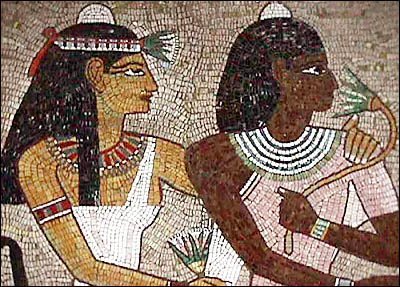
So, why
wouldn't they just say that? Its all about the translation and the
prevailing puritanical attitudes of the church.
It is also interesting that same King Abimelech was on the scene with Isaac and Rebecca so I would assume the name Abimelech is a title and not a name.
Abi-melech again means "My Father the King' or "The King is my Father". Here is the same phrase used in another scripture but the Hebrew phrase Avi or Abi-meleck was translated as "My Father the King".
My Father the King? Hummmm. So the narrator ad translators knew Abimeleck was the Father of one of the characters. It could not have been Sarah could it? What about Abraham? What about Issac?
When Daniel was brought in before the king. The king spoke and said unto Daniel: 'Art thou Daniel, who is of the children of the captivity of Judah, whom the king my father [in Hebrew Abimelech] brought out of Judah? Daniel 5:13.
Can Abimelech and Pharaoh be the same, just at different locations in the story narrative?
ABI (2) - a'-bi, in the composition of names ('abhi, "father"): The Hebrew words 'abh, "father," and 'ach, "brother," are used in the forming of names, both at the beginning and at the end of words, e.g. Abram ("exalted one"), Joah ("Yahweh is brother"), Ahab ("father's brother"). At the beginning of a word, however, the modified forms 'abhi and 'achi are the ones commonly used, e.g. Ahimelech ("king's brother") and Abimelech (by the same analogy "king's father").
These
forms have characteristics which complicate the question of their use in
proper names. Especially since the publication in 1896 of Studies in
Hebrew Proper Names, by G. Buchanan Gray, the attention of scholars has
been called to this matter, without the reaching of any perfect
consensus of opinion.
The word 'abhi may be a nominative with an archaic ending ("father"), or
in the construct state ("father-of"), or the form with the suffix ("my
father"). Hence a proper name constructed with it may supposedly be
either a clause or a sentence; if it is a sentence, either of the two
words may be either subject or predicate. That is to say, the name
Abimelech may supposedly mean either "father of a king," or "a king is
father," or "a father is king," or "my father is king," or "a king is my
father." Further, the clause "father of a king" may have as many
variations of meaning as there are varieties of the grammatical
genitive. Further still, it is claimed that either the word father or
the word king may, in a name, be a designation of a deity. This gives a
very large number of supposable meanings from which, in any case, to
select the intended meaning.
The name Pharaoh:
The idea that the King of Egypt was a son to the Egyptian neteru goes back beyond the Middle Kingdom, right to the beginnings of the kingship and of the royal titulary, to the early days of Dynastic Egypt (and perhaps earlier still). Before going further, it should be pointed out that "pharaoh", the most popular "title" of the Egyptian King, is not Egyptian at all. That is to say, the Egyptians did not call their King "Pharaoh" until very late in their history, and then only as non-Egyptians took up the word. [Per -aa]
"Pharaoh"
is a Hebrew pronunciation of the Egyptian word, per-aa, meaning
"Great House", and was first used as a label for the king himself around
1450 BCE. But the title-word for the King was Nisu, as can be seen for
example in the Offering Formula, or Hetep di Nisu.
"To the Egyptians, names were potent and important. Names represented aspects of a
person and personality, and often more than one name was required to
accomplish this. The concept is not difficult to understand when modern
people remember that we hasten to name our own children properly, with
names full of meaning, or to memorialize an ancestor."
Here is another thought to consider:
"There are different theories concerning the origin of the deceit element of the tale. The majority position is that it originates as a cunning trick by Abraham to get the treaty, the gifts that go with it, and still keep the woman, his wife. However, a significant minority theory, held for example by Robertson Smith, is that originally the early Israelite society was matriarchal and Abraham was not originally present in a significant way in any of the stories of Genesis whatsoever, his role being almost entirely taken by Sarah herself, particularly as the name Israel supposedly derives (Genesis 32:29) from the word Sarita (often translated 'you have struggled'), which is thought to have a linguistic connection with Sarah (c.f. Hosea 12:3 - own sarah El=as a man he struggled with God), which reminds us of Jacob's struggle with Yahweh and his thigh being broken.
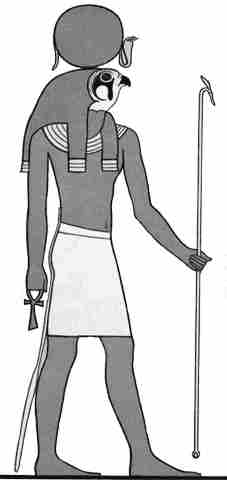
And Jacob
was left alone; and there wrestled a man with him until the breaking of
the day.
And when he saw that he prevailed not against him, he touched the hollow
of his thigh; and the hollow of Jacob's thigh was out of joint, as he
wrestled with him. And he said, Let me go, for the day breaketh. And he
said, I will not let thee go, except thou bless me. And he said unto
him, What [is] thy name? And he said, Jacob. And he said, Thy name
shall be called no more Jacob, but Israel: for as a prince hast thou
power with God and with men, and hast prevailed. Gen.32:24-28.
Thigh is also a euphemism for testicle.
In this theory, Isaac is hence the result of the union between Abimelech and Sarah. The theory goes on to state that as the culture became Patriarchal, so the figure of Abraham was introduced and gradually took over Sarah's role, though obviously this was not possible in the tale of the marriage to Abimelech. Consequently Sarah became variously identified as Abraham's sister or as his wife, the deception part of the tale arising as a result of Sarah having to be Abraham's wife for them both to be parents of Isaac, but also Abimelech's for the treaty, and simultaneously not commit bigamy by having two husbands."
Let's breakdown the Biblical story again:
The first of the stories is found at Genesis 12:10-20, and is the briefest of the three. The story begins by describing Abram migrating to Egypt in order to evade a famine. Noticing how beautiful his wife, Sarai, is, Abram worries that the Egyptians will kill him so that they can marry his wife instead, and so asks her to pretend she is his sister. On arriving before the Pharaoh, the Egyptians recognize Sarai's beauty, and the Egyptian princes shower Abram with gifts of livestock and servants to gain her hand in marriage. Sarai thus becomes part of Pharaoh's house, but Yahweh sends a plague to punish Pharaoh for (unknowingly) causing adultery. Pharaoh consequently realizes the truth of the matter and so sends Sarai and Abram away from Egypt back from where they had come.
So, who was Isaac's Daddy?

To be continued...
Ekowa©
2oo4-2007
Sources
KJV Bible
Webster's Dictionary
Jewish Encyclopedia
http://en.wikipedia.org/wiki/A_wife_confused_for_a_sister
http://www.touregypt.net/featurestories/titles.htmhttp://www.touregypt.net/featurestories/titles.htm